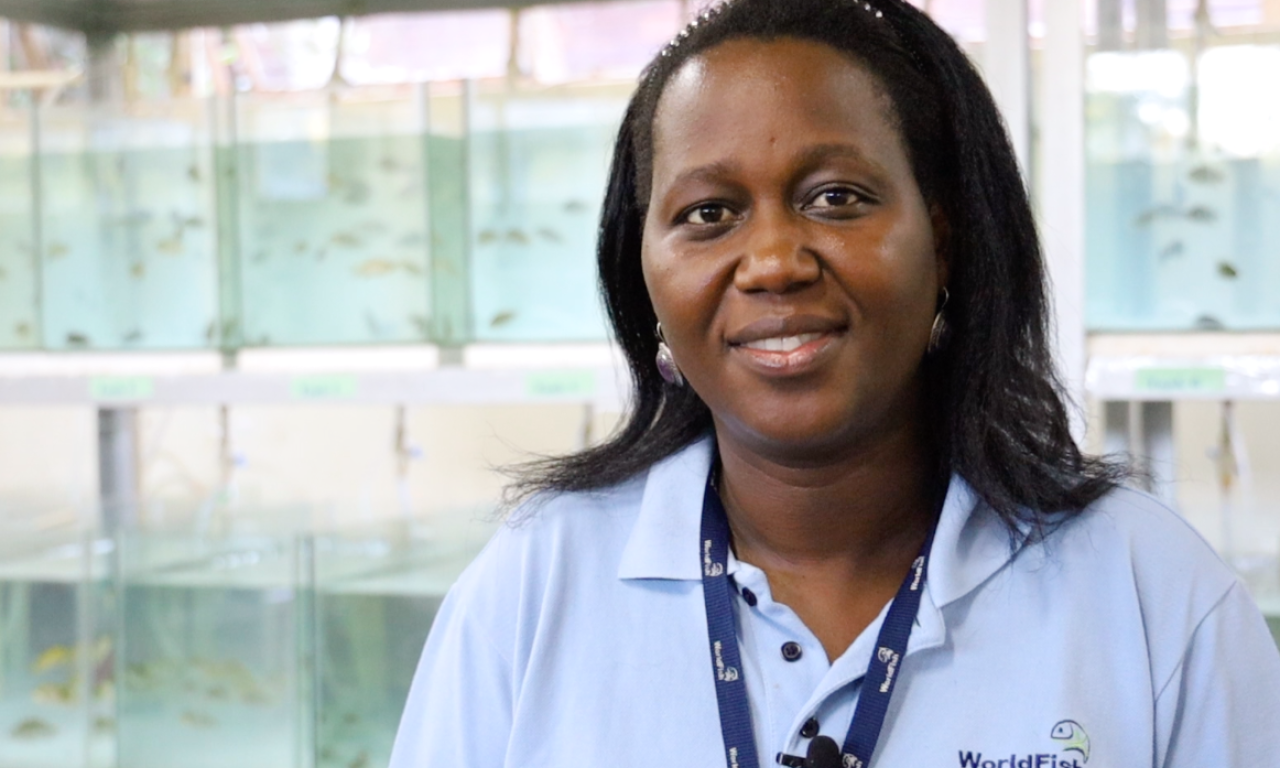
Rose Komugisha Basiita is a WorldFish scientist conducting research in aquaculture and fish genetics. Based in Zambia, her research in fish genetics is helping to advance sustainable aquaculture production in the Southern and East African region. Rose attained her Ph.D. in Aquaculture Genetics from James Cook University with the Centre for Sustainable Tropical Fisheries and Aquaculture under funding from AusAID.
What are you currently working on for WorldFish?
Sustainable aquaculture and fish genetics research. My research in aquaculture is critical to advancing sustainable fish production in the Southern and East African region. Together with the global genetics team of WorldFish and its partners, I lead research on genetic improvement of the three spotted tilapia, Oreochromis andersonii, a key fish species for aquaculture and fisheries within Zambia and the Zambezi watershed, the Oreochromis shiranus in Malawi and Oreochromis mossambicus. The goal is to supply fish farmers with better fish seeds, breeds and technologies in order to harvest the greatest benefits from sustainable intensification of fish production from freshwater and marine ecosystems in close collaboration with national partners.
I am also working with Dr. Rodrigue Yossa, the Fish Feed nutrition scientist for WorldFish, and other partners including the private sector, academic and vocational institutions to improve the quality and sustainability of fish feeds for fish farmers and overall aquaculture industry. This project on which I am the host country Co-PI (Principal Investigator), aims to investigate the effect of partially or totally replacing fishmeal with single cell protein (SCP) ingredients in Tilapia (Oreochromis niloticus) diets.
Another interesting project I am leading is the Aquaculture assessments and value chain pilots for improving fish supply, employment, and nutrition in the Democratic Republic of Congo and Angola project. This project is being implemented in partnership with our sister CGIAR institute “IITA”.
What’s the most exciting thing about your research area and can you describe one of the most memorable situations you’ve found yourself while working in aquaculture and fish genetics?
For me, it’s not necessarily one situation but being part of a larger effort. I’m working on developing genetic research tools useful in aquaculture species development as well as conservation. My favorite part of the research process establishing relationships, influencing the industry directly and indirectly through evidence-based research. I have really enjoyed working in the field where I get to directly engage with development partners and all sorts of stakeholders from farmers, government workers, professors to students in academic institutions.
How will innovation in fish genetics change and impact African and East African aquaculture?
Through innovative genetic tools, we are working to develop a new strain of indigenous fish with characteristics that are both of high production value and environmentally sustainable. We hope that through this innovation we will be able to preserve indigenous fish species while improving nutrition and increasing livelihoods for many people in Zambia, Malawi and many other African countries.
What was the most recent international conference or event at which you have had a chance to showcase your research? What was that like? What was your presentation about?
At the Committee on Fisheries (COFI) meeting, as a genetics scientist in Africa, I delivered a talk “Potential for productivity enhancements through effective genetic improvement and related risks to indigenous diversity” Here, I had to the opportunity to meet with all FAO member state representatives and share my research findings in an effort to launch the book on the World Aquatic Genetic Resources.
What do you hope your research achieves?
I want to make a difference in the communities, governments and private sector where aquaculture research for development is most needed and ultimately increase production, productivity, and accessibility of high-quality sustainable aquaculture products.
What would your dream role be in your research area?
My dream role is to foster innovation by leading research teams and mentoring young scientists around the world. There’s so much potential and creativity coming from teams of young researchers, especially teams made of diverse backgrounds and cultures. Through my experience, I want to be able to support and guide researchers in their career path and pass down my knowledge so that we can continue scientific advancement.